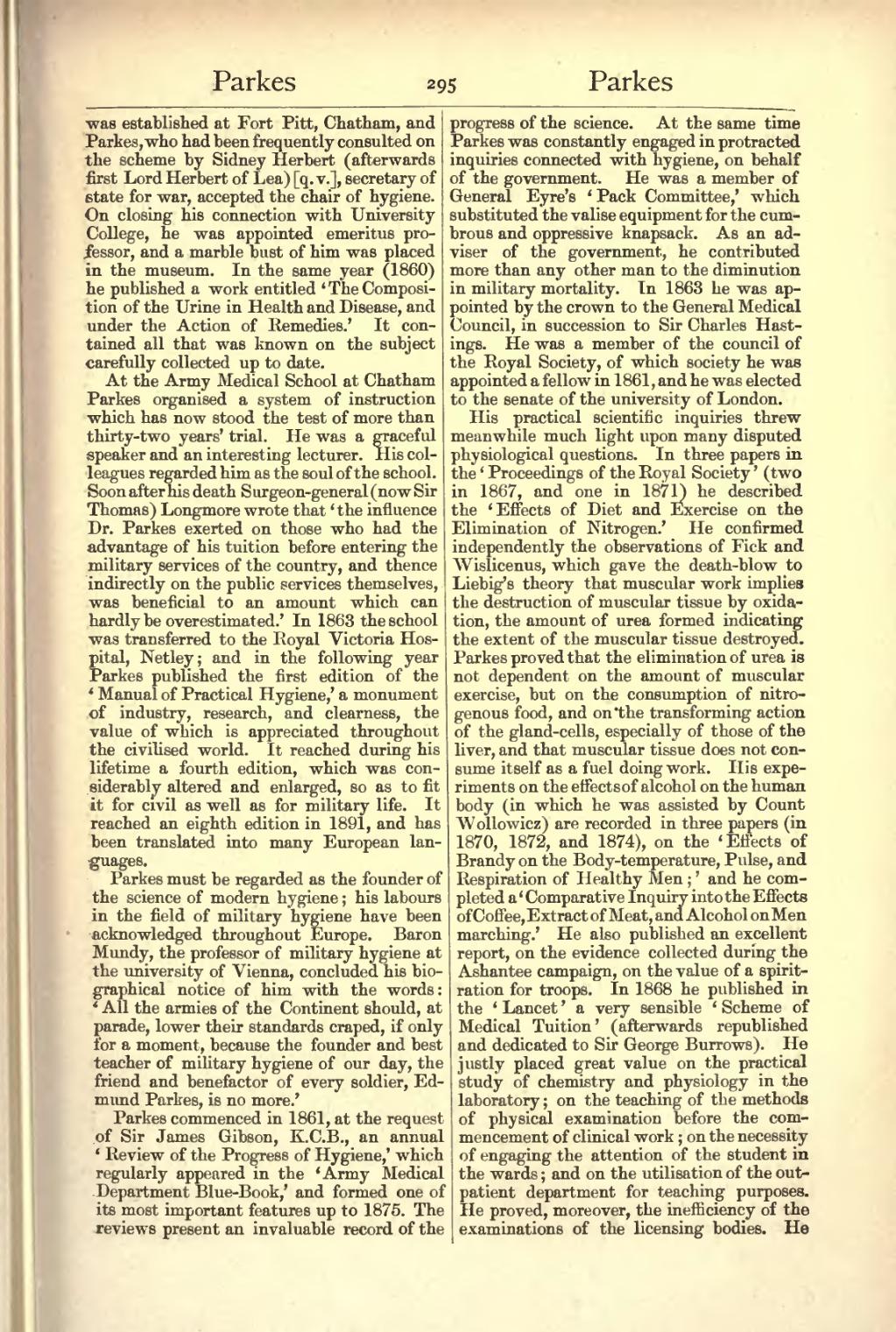was established at Fort Pitt, Chatham, and Parkes, who had been frequently consulted on the scheme by Sidney Herbert (afterwards first Lord Herbert of Lea) [q. v.], secretary of state for war, accepted the chair of hygiene. On closing his connection with University College, he was appointed emeritus professor, and a marble bust of him was placed in the museum. In the same year (1860) he published a work entitled ‘The Composition of the Urine in Health and Disease, and under the Action of Remedies.’ It contained all that was known on the subject carefully collected up to date.
At the Army Medical School at Chatham Parkes organised a system of instruction which has now stood the test of more than thirty-two years' trial. He was a graceful speaker and an interesting lecturer. His colleagues regarded him as the soul of the school. Soon after his death Surgeon-general (now Sir Thomas) Longmore wrote that ‘the influence Dr. Parkes exerted on those who had the advantage of his tuition before entering the military services of the country, and thence indirectly on the public services themselves, was beneficial to an amount which can hardly be overestimated.’ In 1863 the school was transferred to the Royal Victoria Hospital, Netley; and in the following year Parkes published the first edition of the ‘Manual of Practical Hygiene,’ a monument of industry, research, and clearness, the value of which is appreciated throughout the civilised world. It reached during his lifetime a fourth edition, which was considerably altered and enlarged, so as to fit it for civil as well as for military life. It reached an eighth edition in 1891, and has been translated into many European languages.
Parkes must be regarded as the founder of the science of modern hygiene; his labours in the field of military hygiene have been acknowledged throughout Europe. Baron Mundy, the professor of military hygiene at the university of Vienna, concluded his biographical notice of him with the words: ‘All the armies of the Continent should, at parade, lower their standards craped, if only for a moment, because the founder and best teacher of military hygiene of our day, the friend and benefactor of every soldier, Edmund Parkes, is no more.’
Parkes commenced in 1861, at the request of Sir James Gibson, K.C.B., an annual ‘Review of the Progress of Hygiene,’ which regularly appeared in the ‘Army Medical Department Blue-Book,’ and formed one of its most important features up to 1875. The reviews present an invaluable record of the progress of the science. At the same time Parkes was constantly engaged in protracted inquiries connected with hygiene, on behalf of the government. He was a member of General Eyre's ‘Pack Committee,’ which substituted the valise equipment for the cumbrous and oppressive knapsack. As an adviser of the government, he contributed more than any other man to the diminution in military mortality. In 1863 he was appointed by the crown to the General Medical Council, in succession to Sir Charles Hastings. He was a member of the council of the Royal Society, of which society he was appointed a fellow in 1861, and he was elected to the senate of the university of London.
His practical scientific inquiries threw meanwhile much light upon many disputed physiological questions. In three papers in the ‘Proceedings of the Royal Society’ (two in 1867, and one in 1871) he described the ‘Effects of Diet and Exercise on the Elimination of Nitrogen.’ He confirmed independently the observations of Fick and Wislicenus, which gave the death-blow to Liebig's theory that muscular work implies the destruction of muscular tissue by oxidation, the amount of urea formed indicating the extent of the muscular tissue destroyed. Parkes proved that the elimination of urea is not dependent on the amount of muscular exercise, but on the consumption of nitrogenous food, and on the transforming action of the gland-cells, especially of those of the liver, and that muscular tissue does not consume itself as a fuel doing work. His experiments on the effects of alcohol on the human body (in which he was assisted by Count Wollowicz) are recorded in three papers (in 1870, 1872, and 1874), on the ‘Effects of Brandy on the Body-temperature, Pulse, and Respiration of Healthy Men;’ and he completed a ‘Comparative Inquiry into the Effects of Coffee, Extract of Meat, and Alcohol on Men marching.’ He also published an excellent report, on the evidence collected during the Ashantee campaign, on the value of a spirit-ration for troops. In 1868 he published in the ‘Lancet’ a very sensible ‘Scheme of Medical Tuition’ (afterwards republished and dedicated to Sir George Burrows). He justly placed great value on the practical study of chemistry and physiology in the laboratory; on the teaching of the methods of physical examination before the commencement of clinical work; on the necessity of engaging the attention of the student in the wards; and on the utilisation of the out-patient department for teaching purposes. He proved, moreover, the inefficiency of the examinations of the licensing bodies. He
